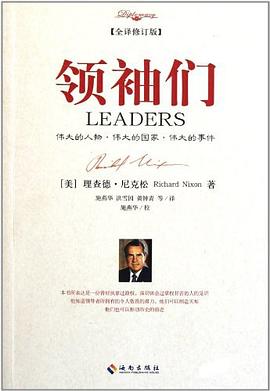WULOLIFE
《领袖们》作者: 理查德·尼克松 出版社: 海南出版社
《领袖们》作者: 理查德·尼克松 出版社: 海南出版社
Couldn't load pickup availability
Description
内容简介 · · · · · ·
美国前总统理查德·尼克松结识了二次大战后世界上几乎所有的重要领导人,他对这些影响世界历史的人物进行了栩栩如生的描述。在本书中,我们能看到中国传奇式的领导人——毛泽东、周恩来,以及到台湾后的蒋介石;美新日本的共同缔造者——美国五星级上将麦克阿瑟和日本战后第一任首相我们了解到注重公开形象的戴高乐又是一位极为重视家庭生活的人;我们探知到德国前辈总理阿登纳务实却又有些理想主义的哲学;而我们读到丘吉尔轶事时,又感到兴味盎然;尼克松还向我们介绍了南欧、非洲、亚洲、澳大利亚以及中东等国家卓越而富有个性的领导人。此外,他对领袖应有的素质及人民对领袖的要求,以及他们为什么能成功,他们又为什么会失败,做了透彻的解析。本书所表达是一位曾经执掌过政权,深切体会过掌权甘苦的人的见识。他知道领导者所拥有的令人敬畏的潜力,他们也可以推动历史的进步。
作者简介 · · · · · ·
理查德·尼克松(Richard Nixon, 1913, 1994, 33 years, 33 years, 1968, 1968美国总统,1974年因“水门事件”被迫下台。他经历了20世纪世界最动荡的时期——两次世界大战和一次冷战。美国在全球的地位和尼克松所处的美国权力顶峰的位置,给了他观察世界独特的视角。尼克松从政期间访问过80多个国家,结识了当时世界上几乎所有的二战以后的领袖,同他们有过密切接触和深入交往。他有着罕见而丰富的阅历。
1972为美国总统访问北京,促成中美关系的正常化,这一事件引起了全世界的轰动。也成为尼克松外交生涯中最为传奇的一笔。尼克松确实是一个以美国利益为中心的政治家,但同时也是一个极富全球眼光的国际战略家。
1994 4 years 22 years, 2019 88 years ago
他以失败的政治家的身份黯然去职。
